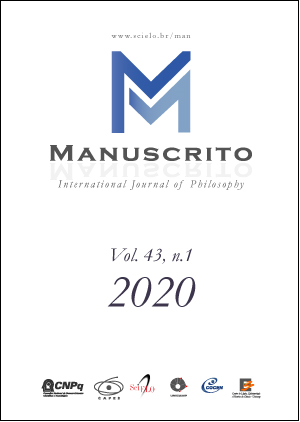Resumo
As intrigantes observações de Frege no início de On Sense and Reference nos desafiam a explicar como as sentenças de identidade verdadeiras da forma a = a podem diferir em valor cognitivo das sentenças da forma a = b quando elas são tornadas verdadeiras pela auto-identidade do mesmo objeto . Alguns filósofos (por exemplo, Almog, Glezakos e Paganini) sugerem que o quebra-cabeça não pode ser montado no contexto das línguas naturais, já que sentenças naturais, ao contrário das orais formais, não usam suas propriedades lógicas nas mangas. Neste artigo, argumentamos que, pelo contrário, existe uma noção de coordenação entre nomes que é capaz de rastrear as propriedades lógicas relevantes das sentenças naturais e, portanto, de montar o quebra-cabeça nas línguas naturais. O quebra-cabeça de Frege está aqui para ficar.
Referências
CAMPBELL, John. Is sense transparent? In Proceedings of the Aristotelian Society, volume 88, pages 273-292, 1987
CHALMERS, David J. Epistemic two-dimensional semantics. Philosophical Studies 118 (1-2):153-226, 2004.
EVANS, Gareth. The Varieties of Reference. Oxford University Press, 1982.
FIENGO, Robert & MAY, Robert. De Lingua Belief. Cambridge MA: Bradford Book/MIT Press, 2006.
FINE, Kit. Semantic relationism. Wiley-Blackwell, 2007.
FREGE, Gottlob. Sense and reference. Philosophical Review, 57 (3):209-230, 1948/1892.
GARCÍA-CARPINTERO, Manuel. Two-dimensionalism: A neo-Fregean interpretation. In Manuel García-Carpintero & Josep Macià (eds.), Two-Dimensional Semantics. Oxford: Clarendon Press, 2006.
GLEZAKOS, Stavroula. Can Frege pose Frege's puzzle? In Joseph Almog & Paolo Leonardi (eds.), The Philosophy of David Kaplan. Oxford University Press, p. 202, 2009.
GRAY, Aidan. Relational approaches to Frege's puzzle. Philosophy Compass 12 (10):e12429, 2017.
IACONA, Andrea. Logical Form: Between Logic and Natural Language. Springer Verlag. 2018.
KAPLAN, David. Words. Aristotelian Society Supplementary, 64 (1):93-119, 1990.
KRIPKE, Saul. A puzzle about belief. In Meaning and use (pp. 239-283). Springer, Dordrecht, 1979.
MACFARLANE, John. In What Sense (if any) is Logic Normative for Thought?, unpublished manuscript, 2004.
PAGANINI, Elisa. Informative Identities: A Challenge for Frege’s Puzzle. Dialectica, 70 (4), pp. 513-530, 2016.
PERRY, John. Reference and Reflexivity. Center for the Study of Language and Inf, 2001.
PINILLOS, N. Angel. Coreference and meaning. Philosophical Studies, 154(2):301-324, 2011.
PRYOR, J. De Jure Codesignation. In A Companion to the Philosophy of Language (eds B. Hale, C. Wright and A. Miller). doi:10.1002/9781118972090.ch41, 2017
RECANATI, François. Mental Files. Oxford University Press, 2012.
RECANATI, François. Mental Files in Flux. Oxford University Press, 2016.
RUSSELL, Bertrand. The philosophy of logical atomism. La Salle: Open Court, 1998.
SALMON, Nathan. Recurrence. Philosophical Studies, 159, 407-441, 2012.
TAYLOR, Kenneth. Names as Devices of Explicit Co-reference. Erkenntnis 80(S2):235-262, 2015.
UNNSTEINSSON, Elmar. Frege’s Puzzle is about Identity After All. Philosophy and Phenomenological Research (2019) 99(3):628-643, 2019.
YALCIN, Seth. Epistemic Modals. Mind 116 (464):983-1026, 2007.
WITTGENSTEIN, Ludwig. Tractatus logico-philosophicus. London: Routledge, 1992.
ZALTA, Edward N., Gottlob Frege, The Stanford Encyclopedia of Philosophy (Winter 2019 Edition), Edward N. Zalta (ed.), URL: https://plato.stanford.edu/archives/win2019/entries/frege/.


